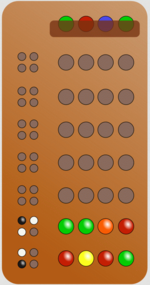
Back قياس احتمالي Arabic Абдукция Bulgarian অপসারক যুক্তিবিন্যাস Bengali/Bangla Raonament abductiu Catalan ڕفاندن (لۆژیک) CKB Abdukce (odvození) Czech Abduktion (metode) Danish Abduktion German Razonamiento abductivo Spanish Abduktsioon Estonian

Abductive reasoning (also called abduction,[1] abductive inference,[1] or retroduction[2]) is a form of logical inference that seeks the simplest and most likely conclusion from a set of observations. It was formulated and advanced by American philosopher and logician Charles Sanders Peirce beginning in the latter half of the 19th century.
Abductive reasoning, unlike deductive reasoning, yields a plausible conclusion but does not definitively verify it. Abductive conclusions do not eliminate uncertainty or doubt, which is expressed in retreat terms such as "best available" or "most likely". While inductive reasoning draws general conclusions that apply to many situations, abductive conclusions are confined to the particular observations in question.
In the 1990s, as computing power grew, the fields of law,[3] computer science, and artificial intelligence research[4] spurred renewed interest in the subject of abduction.[5] Diagnostic expert systems frequently employ abduction.[6]
- ^ a b For example: Josephson, John R.; Josephson, Susan G., eds. (1994). Abductive Inference: Computation, Philosophy, Technology. Cambridge, UK; New York: Cambridge University Press. doi:10.1017/CBO9780511530128. ISBN 978-0521434614. OCLC 28149683.
- ^ "Retroduction". Commens – Digital Companion to C. S. Peirce. Mats Bergman, Sami Paavola & João Queiroz. Archived from the original on August 26, 2014. Retrieved August 24, 2014.
- ^ See, e.g. Analysis of Evidence, 2d ed. by Terence Anderson (Cambridge University Press, 2005)
- ^ For examples, see "Abductive Inference in Reasoning and Perception", John R. Josephson, Laboratory for Artificial Intelligence Research, Ohio State University, and Abduction, Reason, and Science. Processes of Discovery and Explanation by Lorenzo Magnani (Kluwer Academic/Plenum Publishers, New York, 2001).
- ^
Flach, P. A.; Kakas, A. C., eds. (2000). Abduction and Induction: Essays on their Relation and Integration. Springer. p. xiii. Retrieved October 31, 2016.
This book grew out of a series of workshops on this topic. [Budapest 1996; Nagoya 1997; Brighton 1998]
- ^ Reggia, James A., et al. "Answer justification in diagnostic expert systems-Part I: Abductive inference and its justification." IEEE transactions on biomedical engineering 4 (1985): 263-267.
© MMXXIII Rich X Search. We shall prevail. All rights reserved. Rich X Search